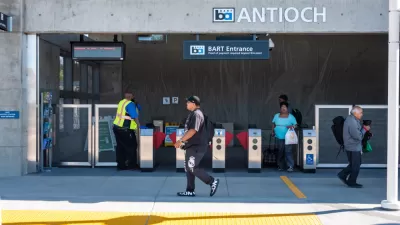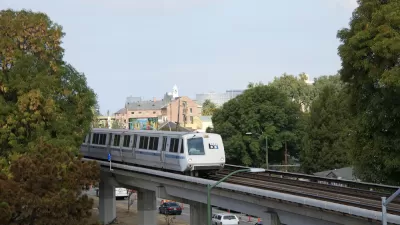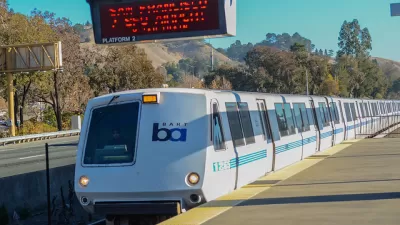Cities can't have it both ways on the housing crisis, asserts an SF Chronicle editorial. Case in point: Berkeley passes a resolution to declare homelessness a state of emergency while opposing legislation to allow BART to develop its parking lots.

"The Berkeley City Council went on record Tuesday [May 29] solemnly urging [#21 in agenda] the governor to declare homelessness a statewide emergency while noting its own 'comprehensive' efforts to grapple with the housing shortage," states the San Francisco Chronicle editorial of May 30.
At the same time, the council formally objected to legislation [#17 in agenda] that might allow new apartments to encroach on the ocean of asphalt surrounding the North Berkeley BART Station.
The bill, AB-2923: San Francisco Bay Area Rapid Transit District: transit-oriented development, would require the BART board to zone the currently unzoned BART parking lot for transit-orient development, consistent with its well-established TOD guidelines. Berkeley would have to update its zoning code for the area with two years. At least 20 percent of the units would have to be affordable.
Opponents, such as the American Planning Association, California Chapter, "argue that the bill would override local planning efforts, including longstanding General Plan land use plans in built-out communities," according to the May 26 legislative analysis.
"The pair of resolutions neatly captured the hypocrisy behind California’s housing crisis, with officials loudly deploring the inadequate supply of homes while digging in against any substantive expansion thereof," opines the editorial board.
“There’s incredible irony in the fact that cities opposing the bill ... are at the same time decrying the housing and congestion crisis,” said Assemblyman David Chiu, D-San Francisco, an author of the legislation. “It’s classic NIMBY-ism.”
The resolution [see May 29 annotated agenda, #17] to oppose the legislation, unless amended in the ways indicated, passed on a 5-4 vote, with Mayor Jesse Arreguín voting with the majority. Three other East Bay cities with BART stations, Hayward, Lafayette, and Concord, whose assemblyman, Tim Grayson, is a co-author of the bill, also oppose AB 2923, along with the League of California Cities.
The bill's two co-sponsors are the State Building & Construction Trades Council of California and the Non-Profit Housing Association of Northern California.
Unlike the much-discussed SB 827, which would have affected the zoning of large amounts of urban land well-served by transit bill, e.g., 96 percent of San Francisco, "AB 2923 would affect a total of a few hundred acres occupied mostly by surface parking lots, Chiu said, and it wouldn’t prevent any development from providing parking," notes the Chronicle. “When you look at the overall land-use authority of these cities, it’s a drop in the ocean.”
While SB 827 died in its first committee hearing on April 17, AB 2923 has passed three Assembly committees and will soon come before the full Assembly.
Hat tip to MTC News Headlines.
FULL STORY: Editorial: BART housing bill exposes lots of hypocrisy

Maui's Vacation Rental Debate Turns Ugly
Verbal attacks, misinformation campaigns and fistfights plague a high-stakes debate to convert thousands of vacation rentals into long-term housing.

Planetizen Federal Action Tracker
A weekly monitor of how Trump’s orders and actions are impacting planners and planning in America.

Chicago’s Ghost Rails
Just beneath the surface of the modern city lie the remnants of its expansive early 20th-century streetcar system.

Bend, Oregon Zoning Reforms Prioritize Small-Scale Housing
The city altered its zoning code to allow multi-family housing and eliminated parking mandates citywide.

Amtrak Cutting Jobs, Funding to High-Speed Rail
The agency plans to cut 10 percent of its workforce and has confirmed it will not fund new high-speed rail projects.

LA Denies Basic Services to Unhoused Residents
The city has repeatedly failed to respond to requests for trash pickup at encampment sites, and eliminated a program that provided mobile showers and toilets.
Urban Design for Planners 1: Software Tools
This six-course series explores essential urban design concepts using open source software and equips planners with the tools they need to participate fully in the urban design process.
Planning for Universal Design
Learn the tools for implementing Universal Design in planning regulations.
planning NEXT
Appalachian Highlands Housing Partners
Mpact (founded as Rail~Volution)
City of Camden Redevelopment Agency
City of Astoria
City of Portland
City of Laramie





























